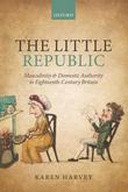Explore

The relationship between men and the domestic in eighteenth-century Britain has, until now, been obscure. The Little Republic rescues the engagement of men with the house from this obscurity, better equipping historians to understand masculinity, the domestic environment and domestic patriarchy. This book reconstructs men’s experiences of the house, examining the authority that accrued to mundane and everyday household practices and employing men’s own concepts to understand what men thought and felt about their domestic lives. This book explores the distinctive relationship between the domestic environment and masculinity, and finds that ‘home’ is too narrow a concept for an understanding of eighteenth-century domestic experience. Focussing instead on the ‘house’, Harvey foregrounds a different domestic culture in which men and masculinity were central. Men acted within the domestic environment as general managers, accountants, consumers and as keepers of the family history in paper and ink. The book explores a model of domestic patriarchy based on a widely-shared discourse of ‘oeconomy’ – the practice of managing the economic and moral resources of the household for the maintenance of good order. ‘Oeconomy’ was a meaningful way of defining masculinity and established the house a key component of a manly identity and in practising ‘oeconomy’, men established their household authority through small acts of power. The book shows how the public identity of men depended upon the roles they performed within doors, straddling the divide of ‘inside’ and ‘outside’ the house.
This book is included in DOAB.
Why read this book? Have your say.
You must be logged in to comment.
